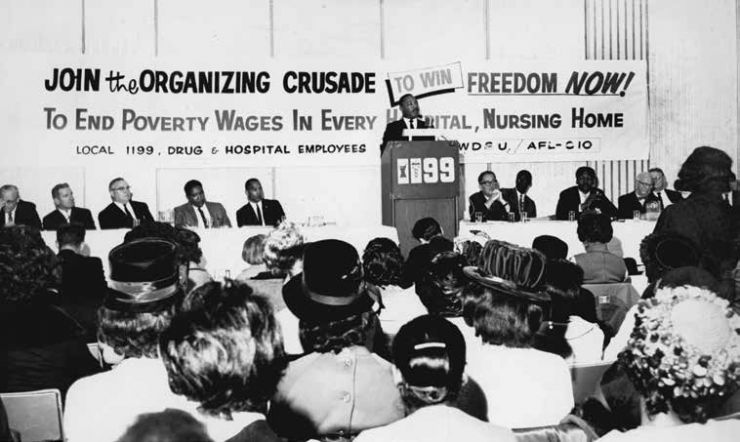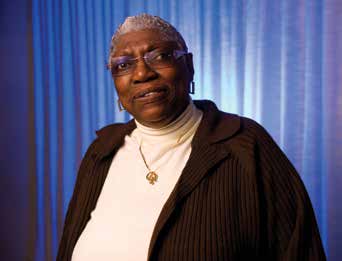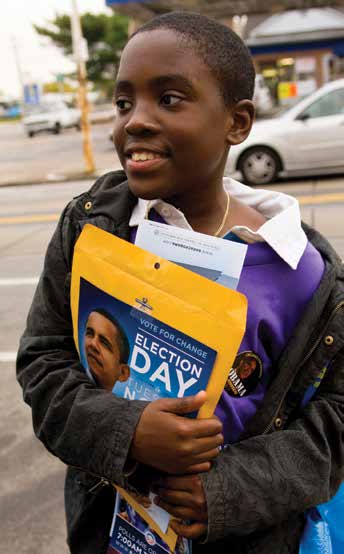Moving Mountains Together
December 18, 2023
Diverse voices are crucial to Union democracy.

“You have provided concrete and visible proof that when Black and white workers unite in a democratic organization like Local 1199, they can move mountains.”
A decade earlier, 1199 represented a mere 5,000 pharmacy workers. The overwhelming majority were Jewish. Many were children of Eastern European immigrants who fled discrimination and murderous pogroms. The young founders also faced anti-Semitism in their adopted country. Many became pharmacists because medical schools at the time limited the number of Jewish admissions.
The Union’s founder and leaders were among left-wing activists of the 1930s who invigorated the labor movement and led the fight for New Deal reforms.
Local 1199 affiliated with the Congress of Industrial Organizations because the CIO practiced industrial unionism, the organizing of all workers in a shop regardless of skill, race, gender or ethnic background.
Early in its existence, the Union led a campaign for the hiring of Black pharmacists and the promotion of Black janitors. This greatly enhanced 1199’s reputation in the Black community and helped to cement its reputation as a social justice Union.
Leaders also built important ties to the city’s Puerto Rican communities. The Union’s first victory at Montefiore Hospital would not have been possible without the leadership of Latino workers such as Salvatore Cordero and Emerito Cruz, as well as others from the Caribbean.
The subsequent hospital organizing campaign was marked by unprecedented unity among the Jewish, Black and Puerto Rican communities.
Because health care depends on public dollars and government regulation, 1199ers never abandoned their political and legislative mobilizations. The money raised through 1199SEIU’s Martin Luther King, Jr. Political Action Fund has been a crucial ingredient in those political campaigns.
The Union chose to name its PAC after Dr. King because his life exemplified 1199 ideals. Dr. King, who was assassinated on April 4, 1968 while defending the rights of low-paid Memphis sanitation workers, constantly strove to connect the labor and civil rights movements.

In the May 1968 commemorative issue of the 1199 magazine, President Leon Davis wrote of Dr. King, “He identified with the struggles of our members just as we identified with him…. We will build our Union in his image. We will raise high the banner of struggle in the fight against poverty, discrimination, ignorance, hate and war.”
An October 1968 article in the Union magazine profiled the work of Vinel JohnsonReid, a retiree from DeWitt Nursing Home in NYC, and Tierra Johnson, a housekeeping delegate from Hopkins.
“When they assigned us together, I wondered what I’d have in common with a 23-yearold,” said Johnson-Reid. “But we work well together. I’ve learned a lot from her. What I don’t know she helps me with, and what she doesn’t know I help her with.”
In the months after Dr. King’s assassination, 1199 began its national organizing campaign, with his widow, Coretta ScottKing, Dr, as its honorary chair. One of the Union’s earliest victories was in 1969 at Baltimore’s Johns Hopkins Hospital.

Annie Henry, an instrument processor at Hopkins, had been there for six months before the victory. She spoke of her experience some 50 years later:
“The hospital was like a plantation; you couldn’t even talk to supervisors. I knew that civil rights and union rights were connected, and by combining the two, we could all better ourselves.”
Among the best examples of 1199ers using their skills as organizers and political activists was the 2008 national election campaign to elect our nation’s first African American president. Thousands of 1199ers – members and staff – took time off, some for months, to work on what they saw as a crusade.
In his Union magazine column, Pres. George Gresham praised the members’ steadfastness and unity. “No Union did more,” he wrote. “We helped to make this campaign into a movement.”
During one celebration after Barack Obama’s 2008 victory, members showed that they clearly recognized their importance and strength when they shouted one of President Obama’s rally cries, “We are the ones we’ve been waiting for.”

